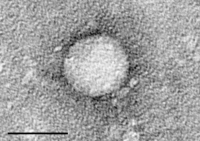
Photo from wikipedia
Impact of substitution of aa70 in the core region (Core aa70) in HCV genotype 1b (HCV‐1b) on hepatocarcinogenesis following eradication of HCV RNA by direct‐acting antiviral therapy is not clear.… Click to show full abstract
Impact of substitution of aa70 in the core region (Core aa70) in HCV genotype 1b (HCV‐1b) on hepatocarcinogenesis following eradication of HCV RNA by direct‐acting antiviral therapy is not clear. In a retrospective study, 533 patients with HCV‐related chronic liver disease, with sustained virological response defined as negative HCV RNA at 12 weeks after cessation of direct‐acting antiviral therapy, were examined to evaluate the relationship between Core aa70 substitution and hepatocarcinogenesis. Twelve patients developed hepatocellular carcinoma during the follow‐up period. The cumulative hepatocarcinogenesis rates were 1.7% and 2.4% at the end of 1 and 2 years, respectively. Overall, multivariate analysis identified HCV subgroup (HCV‐1b with Gln70(His70); P = 0.003) and age (>65 years; P = 0.049), as pretreatment predictors of hepatocarcinogenesis. In HCV‐1b patients, multivariate analysis identified post‐treatment Wisteria floribunda agglutinin positive Mac‐2 binding protein (>1.8 COI; P = 0.042) and HCV subgroup (HCV‐1b with Gln70(His70); P = 0.071), as predictors of hepatocarcinogenesis, including post‐treatment parameter. In conclusion, Core aa70 substitution in HCV‐1b at the start of direct‐acting antiviral therapy is an important predictor of hepatocarcinogenesis following eradication of HCV RNA. This study emphasizes the importance of detection of Core aa70 substitution before initiating antiviral therapy.
Journal Title: Journal of Medical Virology
Year Published: 2018
Link to full text (if available)
Share on Social Media: Sign Up to like & get
recommendations!